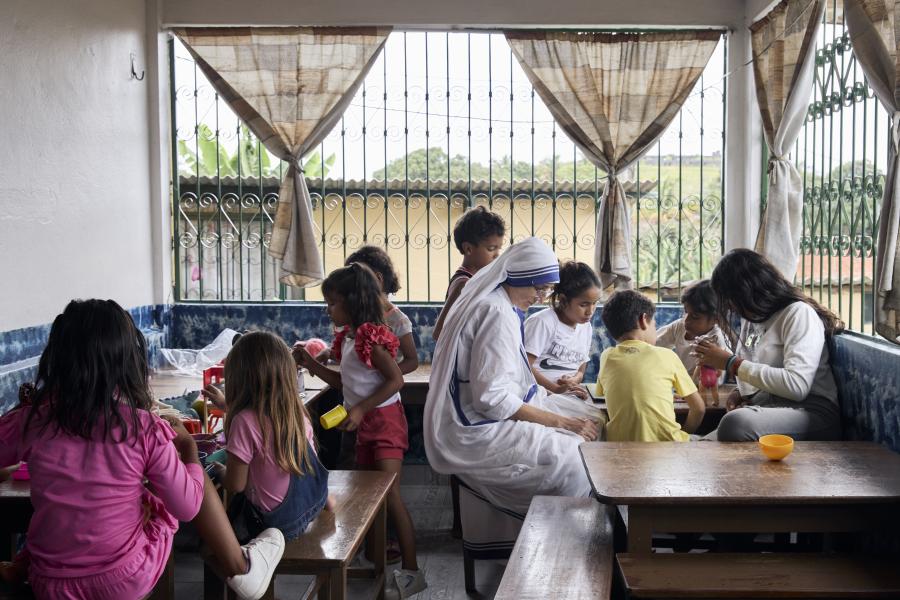Population figures | 2021 - 2025
2025 situation overview
The outflow of Venezuelan refugees and migrants to neighbouring countries and beyond continues. According to the Regional Inter-Agency Coordination Platform for Refugees and Migrants from Venezuela (R4V), co-led by UNHCR and IOM, as of May 2024, there were 7.77 million Venezuelan refugees and migrants worldwide, of whom 85% (6.59 million) were in Latin America and the Caribbean. By mid-2024, there were over 365,500 recognized refugees from the Bolivarian Republic of Venezuela (hereinafter Venezuela) and almost 1.3 million asylum-seekers. Peru is currently undertaking a revision of the number of asylum claims filed by Venezuelan nationals in order to update the figure of Venezuelans present in the country.
Several States in the region have or continue to establish new or expanded legal stay arrangements and temporary protection for Venezuelans. More than 1.9 million of the 2.9 million Venezuelans in Colombia have received temporary protection permits, and in June 2024, a new process was announced to provide legal residency to an additional 600,000 people. Additionally, in September 2024 the Ministry of Foreign Affairs of Colombia announced plans for a new visa for Venezuelan citizens who did not access past regularization mechanisms (such as the Temporary Protection Status for Venezuelan Migrants, or ETPV) which was to be formalized in October 2024. In Ecuador, a new regularization process was announced in May 2024 to benefit 100,000 Venezuelans, in addition to over 95,000 who had obtained temporary residence visas by April 2024. Brazil recognized over 132,000 Venezuelans as refugees and granted over 411,000 temporary residency permits. In May 2024, Uruguay adopted two programmes to provide legal stay solutions for over 23,500 Venezuelan and Cuban nationals with pending asylum applications. Argentina also announced in September 2024 a new regularization process to benefit Venezuelan nationals.
The R4V’s 2024 Refugee and Migrant Needs Analysis (RMNA), published in September 2024, highlighted that 4.2 million Venezuelans living in the region still face difficulties in accessing essential services and formal employment, despite the commendable efforts of host countries in providing humanitarian assistance, legal protection (including documentation and regularization processes), and integration opportunities.
Against a background of economic and political uncertainty, refugees and migrants were also found to face considerable challenges. While across the region nearly 68% of refugees and migrants from Venezuela have succeeded in obtaining a legal status, including as refugees, some 2.3 million remained in an irregular situation, predominantly owing to high costs, strict entry and visa requirements, and complex legal processes.
Lack of access to legal status and sustainable economic opportunities in hosting countries is pushing many to move onwards in search of a more stable future. As of 31 August, 238,000 people had crossed the Darién jungle in 2024, heading northwards. Despite this representing a 30% decrease compared to the same period of 2023, Venezuelans continued to be the main nationality making this crossing (158,000 people).
There has been a notable change in displacement patterns in the region, with new routes being used across Central America and the Caribbean, including through dangerous maritime crossings. In 2025, UNHCR anticipates that new routes could emerge, particularly in the context of tightened migration controls, including through maritime crossings.
UNHCR will continue to work with States across the region to strengthen access to asylum, temporary protection, and other legal stay arrangements. UNHCR will also support States to improve and stabilize the situation of Venezuelan displaced populations through responsibility-sharing arrangements. UNHCR will prioritize local integration and scale up economic inclusion initiatives, based on collaboration with national and local governments, and public and private sector actors.
Inside Venezuela, in response to the deterioration of the humanitarian environment, UNHCR will respond to heightened protection needs following the presidential election. It will work with institutional, humanitarian and development actors, and through its leadership of the Protection and Shelter Clusters, to ensure that people supported by UNHCR can meet their basic needs, reduce their exposure to protection risks, become more self-reliant, and seek options for durable solutions. UNHCR and other actors will also support psychosocial assistance and peacebuilding and peaceful coexistence efforts in communities that have seen their social fabric torn by fallout from the political crisis.
In 2024, as a key partner of the Regional Refugee and Migrant Response Plan (RMRP), and as part of a hemispheric approach, UNHCR and its partners planned to support over 2.93 million Venezuelan refugees and migrants in the region. UNHCR will provide direct assistance and will coordinate the inter-agency response through its R4V leadership role. The RMRP will be updated, with revised population projections, on 6 December 2024.
Financial overview
Entrepreneurship training helps Venezuelan refugees find stability
By Jenny Barchfield in Lima, Peru, and Santiago, Chile
Training courses are helping Venezuelan refugees and migrants across Latin America gain the tools to be self-sufficient and contribute to their host countries.
Read the story










